Senses and sensations
Senses
We learned in school that there are five senses; the senses mentioned by Aristotle in classical antiquity. But the experts are no longer in agreement about whether these are all the senses. Depending on the definition used, they arrive at different numbers. Within the field of sensory processing, we start from eight senses. Eight? Yes, Aristotle’s: seeing, hearing, smelling, feeling and tasting. And three that are less known:
- balance sense: the vestibular system, which transmits information about speed and direction of movement and balance,
- movement sense (proprioception), the posture and movement sense of joints and muscles,
- interoception, the feeling from tissues in your body.
Under- and overresponsive senses
When sensory processing isn’t working well (too little or too much information is passed on), the consequences for our behavior are major. Below we discuss all eight senses.

Would you like to follow a lecture or course about under- and overreponsiveness, based on the work of Sensory Solutions (SenSo)?
You know that sometimes people are overresponsive and can’t focus properly. You may also know that they are sometimes underresponsive and because of the lack of sensory input either remain sleepy and sluggish or become very fidgety, looking for extra sensory input. If you want to know more about this contact us at monique@7zintuigen.nl for:
Movement and posture sense
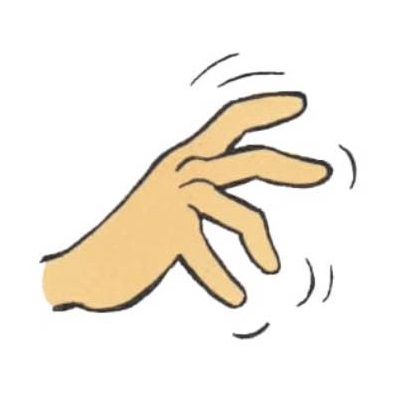
This input is perceived by senses in our muscles and joints. They register the position of joints and movement. Without having to look, we feel exactly where and in what position our body parts are and feel how we move. As a result, you can navigate a curb without having to look at your legs and at the curb. You also know – without looking at your hand – whether your fingers are stretched or bent.
Underresponsive sense of movement and posture
- You stumble because you misjudge the position of your foot in relation to the floor.
- You flop into your seat, because you didn’t estimate the distance from your buttocks to the seat correctly to be able to ‘land’ in a coordinated way.
- You are rough with people and materials because you have no idea how much force it takes to pick something up, or to touch someone to get their attention.
Overresponsive sense of movement and posture
- You experience movement very strongly, so you prefer to sit still.
- You do not want to be moved by others (for example, someone taking you by the hand).
- Even when you sit still you can feel (the posture of) your muscles and joints.
Touch
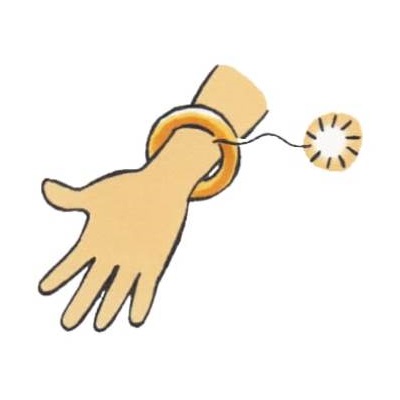
This input is perceived by senses in our skin. For example, you can feel whether something is smooth or rough, hard or soft or warm or cold.
Underresponsive touch
- You leave clothes twisted around your body.
- You have a reduced sensation of pain and temperature.
- You don’t notice that you have a dirty mouth or dirty hands.
Overresponsive touch
- You are hypersensitive to the touch of people and objects and can react irritated and even aggressively.
- You are distracted all day by a small label in your clothes.
- You abhor the idea of having to knead dough, and you won’t be engaging in any pottery activities any time soon. Even the thought of wet clay gives you goosebumps.
Balance
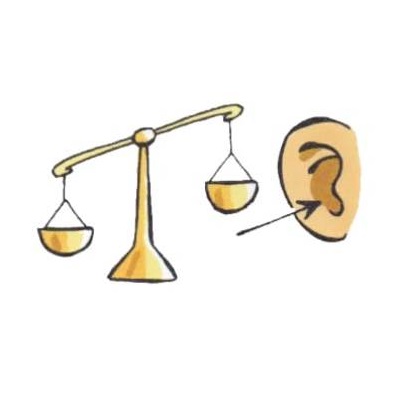
This input is perceived in the vestibular system, in our head next to the inner ear. It provides information about (speed of) movement, which position our head is in and whether we are in danger of falling. The body feels best balanced when the head is upright and the eyes are horizontal.
Underresponsive balance
- You have a great need for exercise, you like to do many sports.
- You are always ‘on the go’.
- You don’t always feel right away when you threaten to be off balance and might fall, which is why you scare others with your (unsafe) climbing and clambering actions.
Overresponsive balance
- You quickly feel unbalanced.
- You get carsick or seasick easily.
- You would rather not go down the water slide and may panic, going down a steep escalator.
Hearing
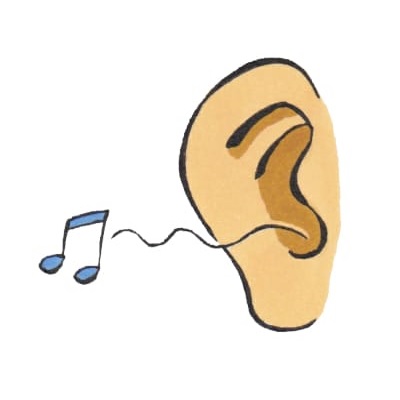
These stimuli are perceived by sensors in the inner ears.
Underresponsive hearing (whereby the hearing is intact)
- You don’t respond when your name is called.
- You miss verbal instructions and, as a result, it may seem to others that you are ignoring them.
- You turn up the radio much louder than most others are comfortable with.
Overresponsive hearing
- Your brain reacts as if sounds (loud or unexpected) are threatening, which makes you anxious and stressed because adrenaline is released.
- You cannot follow what someone is saying to you in a busy environment, you may hear all the surrounding sounds just as loud as the sounds that this person is making.
- You would never attend concerts, a fair or a festival without earplugs.
Vision
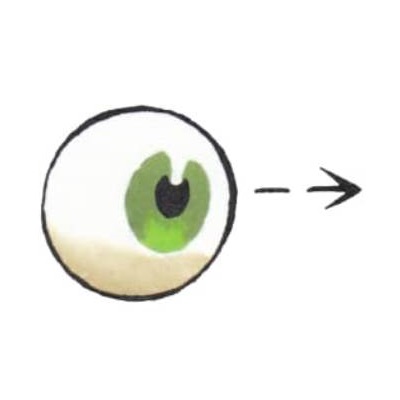
This input is perceived by the eyes.
Underresponsive vision (while your eyes are functioning properly)
- It’s hard to find a key or the right fork in a messy drawer.
- You stare at people and objects to get more information.
- You don’t need sunglasses, even in the bright sun.
Overresponsive vision
- You suffer from (bright) light.
- You are distracted by too many (colorful) decorations in a room.
- You prefer dark spaces.
Smell
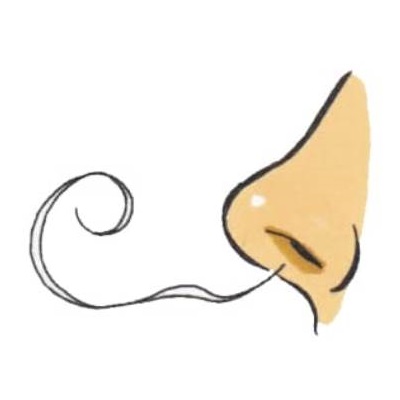
This input is perceived through the nose.
Underresponsive smell
- You like to go near objects and people to smell them.
- You do not perceive strong odors.
- You may put on too much aftershave or perfume.
Overresponsive smell
- You are very sensitive to smells.
- You can get nauseous from an odor that is not smelled by most other people.
- You use odorless washing powder, because otherwise you would smell your clothes all day long.
Taste

This input is perceived by the tongue.
Underresponsive taste
- You like to chew on objects.
- You are looking for strong flavors and you like mustard and hot sauce (a lot).
- You like to try new recipes.
Overresponsive taste
- You are a very picky eater.
- You gag easily.
- You limit yourself to certain flavors and/or structures.
Interoception
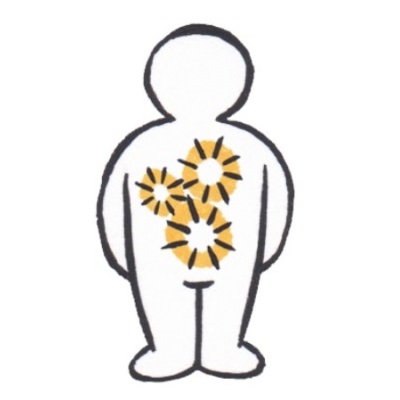
This input is sensed by tissues in your body.
The term interoception means ‘perceiving internally’. It is the term we use to describe the sense through which we perceive what is happening in the organs (such as the bladder and stomach) and other tissues in our body. For example, you feel that you are thirsty or that your stomach is full. The sensors associated with interoception are located in many different places in the body, such as in the wall of the bladder. Do these sensors in the bladder register a certain amount of stretch? Then you know it’s time to go to the bathroom.
Interoception causes you to feel how fast your heart is racing and be aware of the speed of your breathing, how hot you feel and whether ‘you break out in a sweat’. Interoception is also linked to emotions. For example, it is linked to feeling happy, afraid or sad. You need to be able to feel the signals from your body correctly in order to be able to link the right emotion to them. Are your legs shaking, are you sweating and do you have ‘butterflies in your stomach’? Then you might be nervous. Or in love. You have to learn to link what you feel happening in your body and the emotion that goes with it.
What is the influence of Interoception in our lives?
The goal of interoception is balance in your body; to feel as good as possible. Do you feel thirsty? Then you drink something. Are you hurt? Then you remove the cause and take care of the painful area if necessary. Are you afraid? Then you may have to run away from something threatening.
Through experience we learn which signals belong to which emotions and what is useful to do next. When we have gained enough experience, we use the ‘database’ we have built to make predictions about what is present in the environment. That’s what we base our actions on, without thinking about it; are we going to sit on this swing because we have had a great experience with it? Or do we avoid the swing because it made us sick that one time?
Underresponsive interoception
- You don’t feel very well whether you need to use the bathroom.
- You do not immediately realize that you are not feeling well because you need to drink or eat. You did not recognize ‘hunger’ or ‘thirst’ input.
- You feel emotions less quickly and, for example, cannot distinguish well between being afraid or angry.
Overresponsive interoception
- You visit the bathroom very often, because you feel an urgency with a minimally filled bladder or bowel.
- You react violently to minor injuries because they feel very painful.
- You feel your heart beating all the time.

Would you like to follow a lecture or course about under- and overreponsiveness, based on the work of Sensory Solutions (SenSo)?
You know that sometimes people are overresponsive and can’t focus properly. You may also know that they are sometimes underresponsive and because of the lack of sensory input either remain sleepy and sluggish or become very fidgety, looking for extra sensory input. If you want to know more about this contact us at monique@7zintuigen.nl for:
